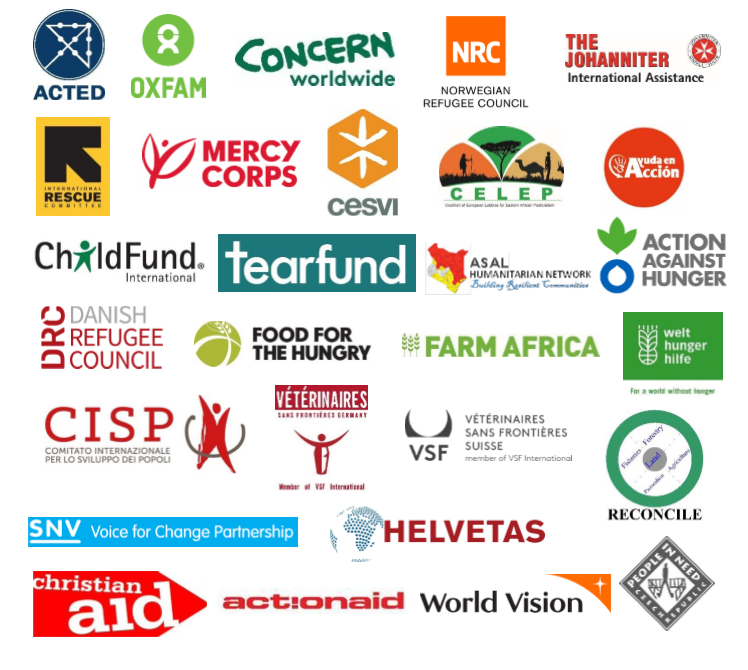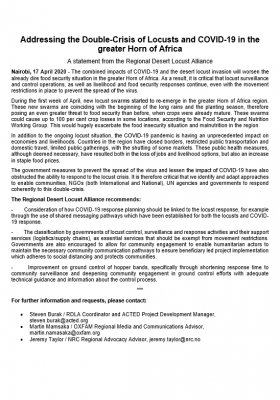A statement from the Regional Desert Locust Alliance
Nairobi, 17 April 2020 – The combined impacts of COVID-19 and the desert locust invasion will worsen the already dire food security situation in the greater Horn of Africa. As a result, it is critical that locust surveillance and control operations, as well as livelihood and food security responses continue, even with the movement restrictions in place to prevent the spread of the virus.
During the first week of April, new locust swarms started to re-emerge in the greater Horn of Africa region. These new swarms are coinciding with the beginning of the long rains and the planting season, therefore posing an even greater threat to food security than before, when crops were already mature. These swarms could cause up to 100 per cent crop losses in some locations, according to the Food Security and Nutrition Working Group. This would hugely exacerbate the food insecurity situation and malnutrition in the region.
In addition to the ongoing locust situation, the COVID-19 pandemic is having an unprecedented impact on economies and livelihoods. Countries in the region have closed borders, restricted public transportation and domestic travel, limited public gatherings, with the shutting of some markets. These public health measures, although deemed necessary, have resulted both in the loss of jobs and livelihood options, but also an increase in staple food prices.
The government measures to prevent the spread of the virus and lessen the impact of COVID-19 have also obstructed the ability to respond to the locust crisis. It is therefore critical that we identify and adapt approaches to enable communities, NGOs (both International and National), UN agencies and governments to respond coherently to this double-crisis.
The Regional Desert Locust Alliance recommends:
- Consideration of how COVID-19 response planning should be linked to the locust response, for example through the use of shared messaging pathways which have been established for both the locusts and COVID19 response.
- The classification by governments of locust control, surveillance and response activities and their support services (logistics/supply chains), as essential services that should be exempt from movement restrictions. Governments are also encouraged to allow for community engagement to enable humanitarian actors to maintain the necessary community communication pathways to ensure beneficiary led project implementation which adheres to social distancing and protects communities.
- Improvement on ground control of hopper bands, specifically through shortening response time to community surveillance and deepening community engagement in ground control efforts with adequate technical guidance and information about the control process.
***
For further information and requests, please contact:
- Steven Burak / RDLA Coordinator and ACTED Project Development Manager, steven.burak@acted.org
- Martin Mamsaka / OXFAM Regional Media and Communications Advisor, martin.namasaka@oxfam.org
- Jeremy Taylor / NRC Regional Advocacy Advisor, jeremy.taylor@nrc.no
Note to editors:
The Regional Desert Locust Alliance brings together National and International NGOs who are responding to the desert locust crisis in the greater Horn of Africa. The Alliance was formed in February 2020 in response to the increased locust threat to food security and livelihoods in eight countries in the greater Horn of Africa – Djibouti, Eritrea, Ethiopia, Kenya, Somalia, South Sudan, Uganda and the United Republic of Tanzania.

Addressing the Double-Crisis of Locusts and COVID-19 in the greater Horn of Africa
Download